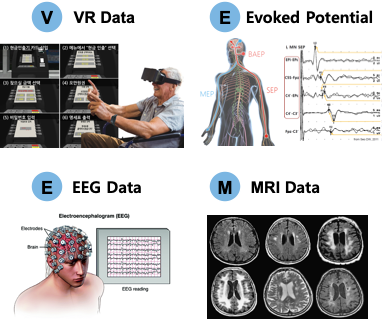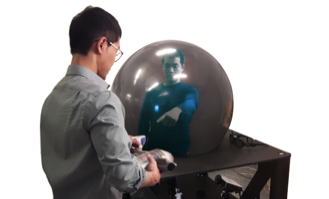치매진단은 행동적 지표(VR), 생리학적 지표(EP), 신경 지표(EEG, MRI) 등 다면적 지표의 측정을 통해 이루어집니다. 현재 VR, EP, EEG, MRI 각각의 개별 지표에 대한 연구는 진행되고 있지만, 지표들 사이의 관계 및 다면적 지표를 하나로 통합할 방법은 아직 불분명합니다. 나아가 이렇게 통합된 정보를 치매조기진단에 활용하기 위해서는 공학과 임상의 융합연구가 필요합니다. 본 기초연구실은 최신 딥러닝 기술(예: TSC-CNN, Multimodal Deep Learning 등)을 활용해 1) 치매조기진단에 있어 VR, EP, EEG, MRI 지표들 사이의 관계를 규명하고, 2) 임상에서 활용가능한 "VEEM 디지털 바이오마커"를 세계 최초로 개발하고자 합니다.
Dementia diagnosis can be implemented by assessing multifaceted measures including behavioral (VR), physiological (EP), and neural performance (EEG, MRI). Currently, research on individual measures of VR, EP, EEG, and MRI is in progress, but the relationship between the measures and how to integrate multi-faceted measures into one is still unclear. Furthermore, to utilize this integrated information for early diagnosis of dementia, convergence research between engineering and clinical is required. Using the latest deep learning technology (e.g., TSC-CNN, Multimodal Deep Learning, etc.), this basic research laboratory aims 1) to identify the relationship between VR, EP, EEG, and MRI measures in early diagnosis of dementia, and 2) to develop “VEEM Digital Biomarkers” that can be used in clinical practice for the first time in the world.
|

 환자의 인지, 행동, 감정을 평가하고 의료진단을 보조하는 인공지능
환자의 인지, 행동, 감정을 평가하고 의료진단을 보조하는 인공지능 

